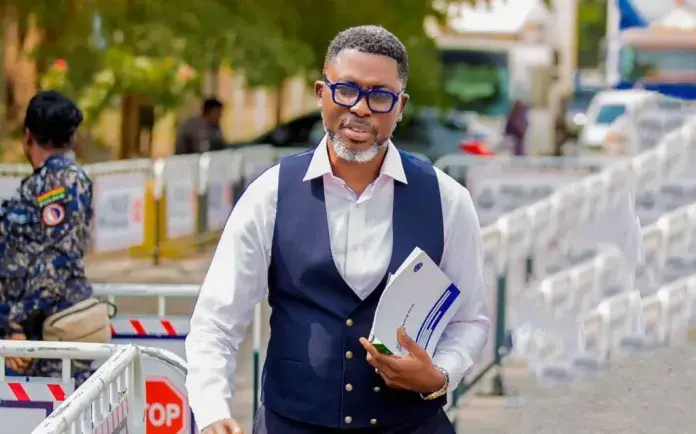Copyright ghanamma

Gomoa Central Member of Parliament (MP) Kwame Asare Obeng has ignited fierce debate over parliamentary accountability standards by questioning whether someone who served at the heart of Ghana’s previous administration should now chair the committee responsible for scrutinizing government financial management. The outspoken lawmaker, popularly known as A Plus, challenged the moral authority of Public Accounts Committee (PAC) Chairperson Abena Osei Asare to interrogate government appointees on accountability matters, arguing the committee cannot command public trust while led by a former deputy to Ken Ofori Atta. His criticism arrives as Parliament intensifies oversight of the current administration barely one year after President John Dramani Mahama took office. Osei Asare served as Deputy Finance Minister from 2017 through early 2024, working directly under Ofori Atta during a period now under intensive investigation by the Office of the Special Prosecutor (OSP). The timing proves particularly sensitive as prosecutors prepare to charge Ofori Atta alongside five others before November ends over the Strategic Mobilisation Ghana Limited scandal that cost the state GH¢506 million. A Plus framed his objections in stark moral terms, insisting ethical clarity requires no legal expertise. He questioned how Ghana could permit someone who served nearly eight years in the previous government to interrogate officials who have held office less than twelve months, particularly when her former superior faces criminal prosecution for alleged procurement fraud and statutory violations. The criticism extends beyond abstract principles to specific controversies that unfolded under Osei Asare’s watch as deputy finance minister. A Plus cited her public defense of former Ghana Revenue Authority (GRA) Commissioner General Ammishaddai Owusu Amoah when he refused to disclose his age during parliamentary hearings, an incident that sparked widespread criticism about transparency expectations for public officials. Owusu Amoah now faces prosecution alongside Ofori Atta for his role approving SML payments on January 3, 2024, the day immediately after President Nana Akufo Addo ordered all contracts suspended pending audit results. The OSP characterized this as a remarkable act of defiance demonstrating how officials circumvented presidential directives to maintain automatic payments detached from actual service delivery. Recent parliamentary hearings have showcased Osei Asare’s confrontational approach as PAC Chair, including a tense October 27 exchange with Driver and Vehicle Licensing Authority CEO Julius Neequaye Kotey over digital number plate specifications. Social media reactions split sharply, with some praising her assertiveness while critics accused her of unnecessary aggression toward public servants attempting to explain technical details. An old video resurfaced showing Osei Asare using similar phrasing she criticized Kotey for employing, telling MP Kwame Governs Agbodza during her time as deputy minister that she was not expecting his question about loan procurement timing. The clip highlighted what some observers characterized as situational standards where accountability expectations shift based on which side of the questioning table one occupies. A Plus identified three major contracts currently under investigation that directly involve Osei Asare’s tenure at the Finance Ministry. Beyond SML, he cited the Electricity Company of Ghana Beijing Jao loss reduction agreement and the Health Ministry ambulance procurement deal, all signed and implemented during the period she served as deputy finance minister responsible for budget preparation and parliamentary liaison. The OSP investigation into SML revealed systematic failures across multiple government institutions including the Finance Ministry, which approved contracts despite clear rejections from the Public Procurement Authority based on capacity concerns. Prosecutors found the ministry engaged in reckless decision making and flagrant statutory violations, pushing SML engagement through persistence rather than legitimate procurement justification. Osei Asare herself has called on the OSP to maintain professionalism in its investigation of Ofori Atta, stressing that while she preferred not to comment extensively on the ongoing case, the office must discharge its duties with integrity and fairness. Her measured response contrasts with A Plus’s direct challenge, reflecting differing views on whether past service under investigation disqualifies current oversight authority. Parliament appointed Osei Asare as PAC Chairperson in March 2025, replacing James Avedzi who previously held the position. The committee carries constitutional responsibility for scrutinizing government financial expenditures and ensuring accountability in public fund usage, making its leadership selection politically sensitive given Ghana’s recurring corruption challenges. A Plus emerged in Ghana’s music scene as a hiplife artist with strong inclination toward political and social commentary, gaining prominence with his 2000 album Freedom of Speech released during general elections. His transition from musician to lawmaker maintained his reputation for direct confrontation of perceived hypocrisy regardless of political affiliation, though critics sometimes dismiss his interventions as attention seeking rather than substantive contribution. The MP urged national leadership to embrace what he called God fearing governance, arguing that speaking truth requires spiritual accountability rather than political bravery. He insisted public office demands conscience and reverence, warning that holding positions without moral foundation leads to social and economic harm preventing national progress. His religious framing resonated with constituents who view corruption as fundamentally spiritual rather than merely procedural failure. A Plus maintained that Ghana cannot advance without leaders committed to truth, regardless of partisan pressures or career advancement considerations that often incentivize silence over accountability. The controversy exposes deeper tensions about how democracies balance continuity with accountability when political transitions occur. Parliamentary committees typically include members from both government and opposition, creating situations where former ministers must scrutinize current officials while potentially facing investigation themselves for decisions made during their own tenure. Some governance experts argue this rotating accountability model strengthens democracy by ensuring experienced oversight from those who understand government operations intimately. Critics counter that it creates conflicts of interest where former officials protect institutional practices they participated in rather than objectively evaluating current performance against stated standards. The debate extends beyond Osei Asare individually to systemic questions about qualification standards for committee leadership positions. Ghana maintains no formal restrictions preventing former ministers from chairing oversight bodies that examine their own policy domains, relying instead on parliamentary discretion and political negotiation to determine appropriate appointments. International comparisons reveal varied approaches. Some democracies mandate cooling off periods before former ministers can chair committees overseeing their previous portfolios, while others embrace the experience such individuals bring to complex oversight responsibilities. No consensus exists on optimal balance between institutional knowledge and potential bias. Osei Asare’s defenders emphasize her professional credentials as a banker and chartered accountant, along with her record as one of Parliament’s most vocal MPs during her early terms. They argue technical competence and parliamentary experience matter more than previous ministerial roles when assessing oversight capability, particularly since committee decisions require majority approval rather than unilateral chair authority. The timing proves particularly challenging for the New Patriotic Party (NPP) as it adapts to opposition status after losing the 2024 elections. Party members face scrutiny over eight years of governance decisions while simultaneously attempting to hold the current administration accountable for its first year performance, creating natural tensions about who possesses moral standing to question whom. A Plus urged leaders to approach governance with humility and accountability, insisting that ethical frameworks must prevent individuals from challenging others on matters where their own conduct remains under investigation. He called for Osei Asare to face committee inquiries herself rather than posing questions to state officials, characterizing her position as a national disgrace rather than legitimate oversight authority. The PAC has not officially responded to A Plus’s criticisms, maintaining focus on scheduled hearings examining various government agencies and state enterprises. Committee members continue regular sessions broadcast live, providing public visibility into how parliamentary oversight functions regardless of leadership controversies. As investigations into previous administration contracts proceed toward prosecution, the debate over appropriate accountability standards will likely intensify. Ghana faces fundamental questions about whether institutional legitimacy requires separation between those who made decisions and those who scrutinize them, or whether rotating responsibilities strengthen democratic practice through shared understanding of governance complexities. The outcome matters beyond individual personalities to establish precedents for future transitions. How Parliament resolves tensions between continuity and accountability will influence public confidence in oversight mechanisms designed to prevent corruption and ensure responsible resource management regardless of which party holds power.



